- Home
- Sue Grafton
P Is for Peril Page 14
P Is for Peril Read online
Page 14
"What do you think she heard?"
"Doesn't matter. It's none of her business. I just thought you should be aware of it in case we run into her."
We took a left, passing the staff lounge, central supply, and then a series of residential rooms. Many doors were closed, the exteriors decorated with greeting cards or wreaths of dried flowers. Sometimes the names of the occupants were spelled out in foil letters hanging jauntily from a miniclothesline of ribbon or string. Through the doors that remained open, I caught glimpses of twin-sized beds with floral spreads, photographs of family members lined up on the chests of drawers. Each room had a different color scheme and each looked out onto a narrow garden where flowering shrubs trembled with the first drops of a pattering rain. We passed an old woman, stumping down the hall with her walker. Her pace was rapid and when she reached the corner, she turned with such vigor she threatened to topple sideways. Merry reached out a hand and steadied her. The woman banked, swerving wide, and then tottered on.
Ruby Curtsinger was sitting in an upholstered chair beside a set of sliding glass doors, one of which was pushed back to admit a breath of damp, fresh air. Her feet were propped on a stool. Just outside, a bird feeder was suspended from the eaves. Small brown birds were perched on the feeder's edge. A line of birds, like clothespins, extended from the hanging support. Ruby was a tiny, shrunken woman with a small bony face and arms as thin as sticks. Her white hair was sparse, but it looked as if she'd recently had it washed and set. She turned a pair of bright blue eyes toward us and smiled, showing the many gaps in her lower teeth. Merry introduced us and explained what I wanted before she withdrew.
Ruby said, "You should talk to Charles. He saw Dr. Purcell after I said good-night to him."
"I don't think I've heard of Charles."
"He's an orderly on the night staff. He's probably here somewhere. He likes to come into work early so he can visit with Mrs. Thornton and some of the other girls. They play gin rummy for pennies and you should hear them hoot. When I have trouble sleeping, I ring for him and he'll put me in my chair and push me up and down the halls.
Sometimes I sit in the staff lounge and play euchre with him. The man does love to play cards. I take my meals here in my room. There are folks in the dining room I don't much care for. One woman chews with her mouth open. I don't want to look at that when I'm eating. It's disgusting.
"The night you're asking about – when I last saw the doctor – I took my usual pills, but nothing seemed to help. I rang for Charles, and he said he'd take me on Toad's Wild Ride. That's what he calls it. In truth, he wanted to smoke so he parked me in the lobby and went outside. That's why I was sitting there, so Charles could sneak a cigarette. He's trying to quit and I guess he thinks if no one knows what he's doing, it won't count. Dr. Purcell doesn't allow anyone to smoke in here. He says too many people have problems breathing as it is. That's one thing we talked about that night."
"What time was this?"
"Five minutes to nine or so. We didn't chat long."
"Can you remember anything else?"
"He told me I was beautiful. He always says that to me, though I sometimes think he's fibbing just a tiny bit. I asked about his boy. I forget what his name is,"
"Griffith."
"That's it. Doctor used to have his wife bring the little boy in to see us every week or so. Of course, she hasn't brought him even once since his daddy disappeared. I notice the child's feet scarcely ever touched the floor. They carried him every place and anything he wanted, he pointed to and grunted. I told the doctor, 'He's never going to learn to talk as long as you treat him that way,' and he heartily agreed. And then we talked about the weather. It was a lovely night outside. Felt just like spring and I believe the moon was almost full. He went through the door and that's the last I saw of him."
"Could you tell what kind of mood he was in? Mad? Sad?" She put an index finger against her cheek and gave that some thought. Arthritis had bent the thumb on that hand until it formed a painful-looking angle perpendicular to her hand. "Absentminded, I'd say. I had to ask him twice if he could arrange an outing for us. The food here is good. I don't mean to complain, but eating out is fun and gives us all a lift. Any little change makes such a difference."
A Hispanic woman in scrubs appeared at the door. "I have your dinner tray, Miss Curtsinger. You want to eat in front of the TV so you can watch your show? It's coming on in five minutes and you don't want to miss the opening. That's the best part you said." She crossed to Ruby's chair and set the dinner tray on a small rolling table that she pulled in close. She removed the aluminum lid, revealing the barbecued riblet laid out with all its accompaniments. The Jell-O was green with a smattering of fruit cocktail submerged in its glowing depths. "Thank you," Ruby said, and then she smiled at me. "Will you come back and see me, dear? I like talking to you."
"I'll do what I can. Tell you what – next time, I'll bring you a Quarter Pounder with Cheese."
"And a Big Mac. I see those ads on television and they always look so good."
"Believe me, they are. I'll bring you one of those, too." I walked down the hall as far as the staff lounge, where I stuck my head in and said, "I'm looking for Charles."
The man I saw sitting at the table with the evening paper was in his fifties and was dressed in scrubs, like the woman bringing out the trays. He was a mild nut brown, and narrow through the shoulders, his arms hairless and scrawny. He set his paper aside and got to his feet politely to identify himself. "Charles Biedler," he said. "How may I help you, Miss?"
I explained who I was and what I wanted, repeating the gist of what Ruby Curtsinger had told me. "I know you've answered these questions before, but it would really be a help if you'd tell me what you remember."
"I could show you where he was parked and where I stood that night."
"I'd love that," I said. He picked up a folded section of the paper and carried it with him as we moved toward the entrance. I paused to retrieve my umbrella and my slicker, which I held over my head like a yellow plastic tent. Charles used his newspaper as a rain hat and we hurried outside, hunched against the rain, which was blowing against us in gusts. Charles paused at the end of the walkway, pointing toward the cars. "See where that little blue VW's parked? Doctor's space was right there. I saw him crossing the lot and then he got in his car and pulled out right around to here."
"You didn't see anyone else?"
"No, but now that corner of the parking lot was darker at nine o'clock than it is right now. Warm that night. I was in my shirt sleeves like this only without the gooseflesh. I spoke to him like always, you know, calling out a word and he said something back, kind of bantering like."
"There was nothing unusual?"
"Not as I recall."
"I'm trying to see this as you did. Ruby says he had his suit jacket over his arm. Did he carry anything else?"
"I don't think so. I can't picture it if he did."
"What about his car keys?"
"I guess he must have had those in hand. I don't remember him reaching in his pocket."
"So he unlocked the car door and then what?"
"I don't remember nothing about that."
"Did the interior light go on?"
"Might have. After he got in, he sat a while and then he started up the engine and swung around this way so he could drive out the front."
"Was that his pattern?"
Charles blinked, shaking his head. "Most times."
His newspaper was getting soaked and I knew it was time to retreat to the overhang.
"Let's get out of this rain," I said.
We headed back to the entrance, pausing again just outside the front door.
I said, "Was there anything else? Anything at all, even if it seems trivial."
"He didn't call out good-night like he usually did when he drove past. Last thing he'd do, he used to wave and shake a finger, kind of teasing me like, because I told him I quit smoking."
"Was the car window
down?"
"I couldn't say for sure."
"You didn't see anyone in the car with him?"
Charles shook his head.
"Are you sure?"
"Pretty sure. And truthfully, that's as much as I know."
"Well, I appreciate your time. If you should think of anything else, would you give me a call?" I took a business card from my bag and handed it to him. "I can be reached at this number. There's a machine if I'm gone."
As I left the porch and started out across the parking lot, I turned and waved. Charles was still there, staring after me.
I sat in my car for a while, thinking about the fact that I was parked right where Dow Purcell had been on the night of September 12 I did a 180 survey, turning my head. What had happened to him? The rain kept tapping on my car roof like the restless drumming of fingers on a tabletop. He hadn't been assaulted. He'd gotten in his car and he'd sat there a while... doing what? I started the car and backed out of the space, heading, as Purcell had, toward Dave Levine Street. I glanced back at the building. Charles was gone by then. The walk was empty and the rain slanting against the light made the entrance seem bleak.
I turned right, scanning the street on either side of me. The area was residential. St. Terry's Hospital was only four blocks away. There were medical buildings in the surrounding area, apartment buildings, and a few private homes, but not much else. No bars or restaurants along this stretch where he might have stopped for a drink. Once I reached the next intersection, it was impossible to guess which way he might have gone.
I circled back to the office, and by 5:30, I was typing up a rough draft of the next installment of my report. It helped to be forced to lay it all out again in narrative form. I'd done an additional four hours of work, which I deducted from the balance of the retainer, leaving me $1,125 of indentured servitude. I could feel anxiety whispering through my bones. I was no wiser now than I'd been when I first started and probably no closer to finding Dr. Purcell. I didn't even have a scheme, no clever strategy about how to proceed. What more could I do? Fiona wanted results. I was moving, but getting nowhere. I checked my watch. 6:02. I leaped to my feet. I was already late for Rosie's, but it couldn't be helped. I shoved the report in my handbag, thinking I could work on it later if I needed to.
Traffic was heavy on the rain-slick streets. While stuck at a stoplight, I turned the rearview mirror to check my appearance. I seldom wear makeup so I looked much the same; sallow by the light of street-lamps, my hair a dense thatch of brown. I felt less than glamorous in my jeans and turtleneck, but it couldn't be helped. I didn't have time to go home and change. Into what? I don't have anything else. This is what I wear.
I parked my car in front of my apartment and dog-trotted the half block to Rosie's. I pushed open the door, dumped my umbrella, and left my slicker on a peg. Where Friday night the place had been emptied by the weather, tonight it was jammed. Both the jukebox and the television were going full-blast, Monday Night Football having captured a rowdy cluster of sports enthusiasts at the bar. The cigarette smoke was dense and all the tables were taken. I saw William emerge from the kitchen with a tray at shoulder height while Rosie was uncapping beer bottles as fast as she could. I searched the crowd, wondering if I'd managed to arrive before Tommy Hevener. I felt a plucking at my sleeve and looked down to find him looking up at me from the first booth on the right.
Oh, my.
He was freshly shaved and he'd changed into a white dress shirt with a sky-blue wool crew neck pulled over it. He said something I missed. I leaned closer to him, taking in the scent of Aqua Velva. When he repeated himself, his voice in my ear set up a tickling chill that went down to my feet. "Let's get out of here," he said. He got up and grabbed his raincoat off the seat across from him.
I nodded and began to inch my way toward the door again. I could feel him following, one hand against my back. The gesture assumed a familiarity I should have objected to, but didn't. We paused at the entrance while I collected my slicker and my umbrella. He shrugged into his raincoat and turned the collar up. "Where to?" he asked.
"There's a place one block over. Emile's-at-the-Beach. We can walk."
His umbrella was the larger so he raised it and held it over my head as we emerged into the pelting rain. I kept my hand on the stem a fraction of an inch from his and we moved forward with the odd gait one assumes when walking in tandem. The rain was coming down so hard, the water was propelled through the umbrella fabric like a mist. A car passed, throwing up a plume that landed in front of us with a splat.
Tommy stopped. "This is nuts. I've got a car right here." He took his keys out and unlocked the passenger-side door on a new Porsche, painted candy-apple red with a license plate that read HEVNER 2. I stepped from the curb to the interior, not a dainty maneuver given the low-slung chassis and the torrents of rainwater coursing through the gutter. He closed me in on my side and then circled in front of the car to his. The interior was done in caramel-colored leather, the whole of it smelling as earthy and rich as a tack room.
"Where's your pickup?" I said.
"That's business. This is play. You look great. I've missed you."
We chatted about nothing in particular on the short drive over to Emile's. Tommy let me off at the door. I went inside and staked out a claim for us while he found a place to park. We were seated at a table for two, next to the window in the narrow side room. The air smelled of sautéed garlic and onion, roasting chicken, and marinara sauce. The atmosphere was intimate with only half the tables occupied because of the rain. There was a quiet buzz of conversation and the occasional clatter of silverware. Votive candles provided circles of light in the darkened space. The waiter brought us two menus, and after a quick consultation, Tommy ordered a bottle of California Chardonnay. While we waited for that, he sat and played with a fork, making plow lines along the edges of a paper napkin. His watch was white gold and he wore a gold ID bracelet, heavy links glimmering against his ruddy skin. "I went back and read your rental application. You're divorced."
I held up two fingers.
He said, "I've never been married. Too much of a rolling stone."
"I tend to appeal to guys on the move," I said.
"Maybe I'll surprise you. Where's your family?"
"My parents died in a car accident when I was five years old. I was raised by my mother's sister, my aunt Gin. She's dead now, too."
"No siblings?"
I shook my head.
"What about the husbands? Who were they?"
"The first was a cop... I met him when I was a rookie..."
"You were a cop?"
"For two years."
"And the second?"
"He was a musician. Very talented. Not so good at being faithful, but he was nice in other ways. He cooked and played piano."
"Skills I admire. And where is he now?"
"I haven't any idea. You said your parents were gone?"
"It's weird being an adult orphan, though not as bad as you'd think. What'd your father do for a living?"
"Mail carrier. My folks were married fifteen years before I came along."
"So you only had five years together as a family."
"I guess that's right. I hadn't thought of it that way."
"Poor babe."
"Poor everyone. Such is life," I said.
The waiter returned with our Chardonnay and we watched him politely as he went through the ritual of extracting the cork, presenting a sample of wine, and then pouring two glasses. We hadn't even looked at the menus so we were accorded a few minutes to decide what we wanted. I ended up ordering the roast chicken and Tommy ordered the pasta puttanesca. We shared a salad up front. Once the entrees arrived, Tommy said, "Tell me about the boyfriend. What's the deal on him?"
I lowered my fork, feeling defensive on Dietz's behalf. "Why should I talk to you about him?"
"Don't be so prickly. I'd like to know what's going on here. Between us."
"Nothing's going on. We're having d
inner."
"I think there's more to it than that."
"Really. As in what?"
"I have no idea. That's why I'm asking you."
"What are we doing here, defining our relationship? I've known you an hour."
His smile was slow. He seemed unaffected by my churlishness, which I couldn't seem to control. "Actually, I think it's closer to two hours than one. I saw you at the rental property twice before and now this." He finished the wine in his glass and poured himself more, adding wine to my glass first. His eyes were really the most extraordinary shade of green.
I said, "Well, I haven't known you long enough. Besides, you're too young."
He lifted his brows and I found myself blushing.
I said, "How'd you decide to move to Santa Teresa?"
"You're changing the subject."
"I don't like to be pushed," I said.
"Let's talk about sex. Tell me what you like in bed in case it ever comes up."
I laughed. "Let's talk about grade school. I hated mine. How'd you feel about yours?"
"Good. It was fun. I was captain of the Safety Council two years in a row. I went to four different colleges, but didn't graduate. I may try it again some day. I'd like to finish my degree."
"I did two semesters of junior college and didn't like it at all. I took Spanish in adult education, but I've forgotten everything except 'ola' and 'buenos dias.' "
"You cook?"
"No, but I'm a tidy little thing."
"Me, too. My brother's a pig. You'd never guess it by looking. He dresses okay, but his car's a mess."
"I carry cans of motor oil in my backseat."
"Part of your work," he said, forgivingly.
We chattered on in this fashion and I found myself liking his face. Also, I was not exactly unaware of his body, lean and muscular. I wondered where Dietz was tonight. Not anywhere in range, so what difference did it make? Few men appeal to me, not so much because I'm picky about them. I'm protective of myself, which means I disqualify all but the most – what... ? I couldn't think what it was that allowed some men to get through my defenses. Chemistry, I guess. I focused on cutting my chicken, trying a sample of mashed potatoes, which rank right up there with peanut butter, in my opinion.

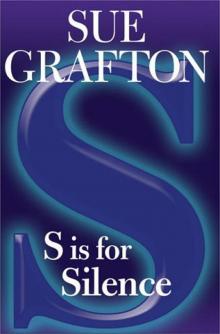 S Is for Silence
S Is for Silence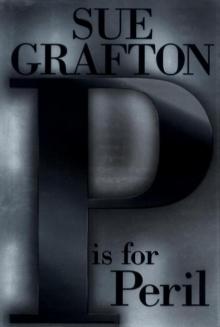 P Is for Peril
P Is for Peril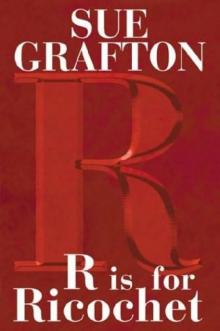 R Is for Ricochet
R Is for Ricochet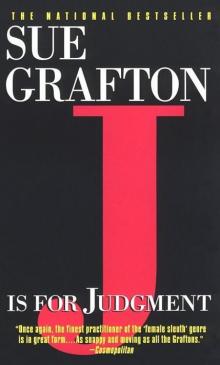 J Is for Judgment
J Is for Judgment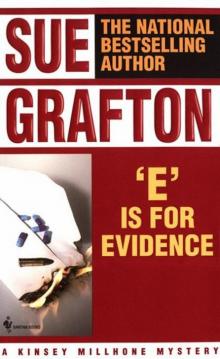 E Is for Evidence
E Is for Evidence T Is for Trespass
T Is for Trespass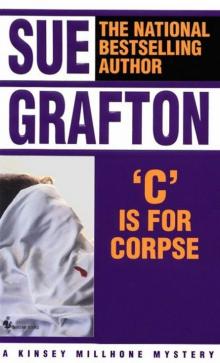 C Is for Corpse
C Is for Corpse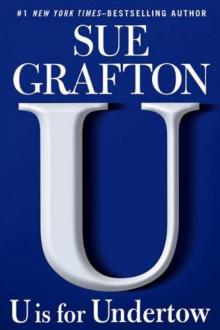 U Is for Undertow
U Is for Undertow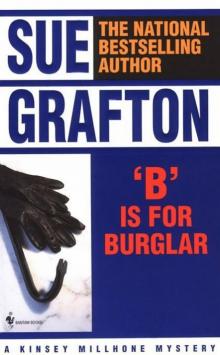 B Is for Burglar
B Is for Burglar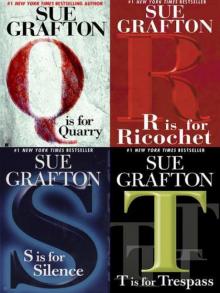 Four Sue Grafton Novels
Four Sue Grafton Novels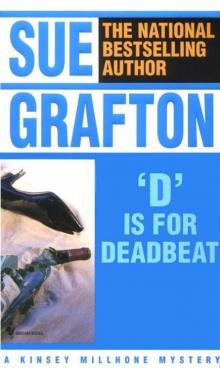 D Is for Deadbeat
D Is for Deadbeat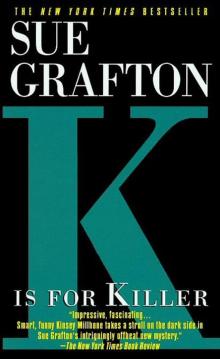 K Is for Killer
K Is for Killer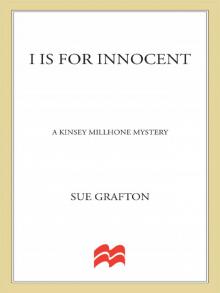 I Is for Innocent
I Is for Innocent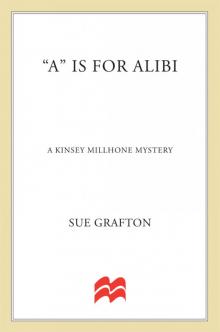 A Is for Alibi
A Is for Alibi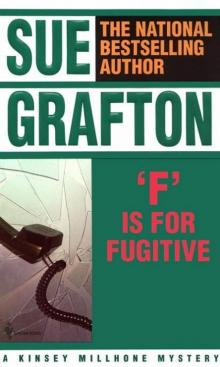 F Is for Fugitive
F Is for Fugitive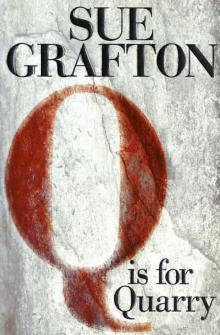 Q Is for Quarry
Q Is for Quarry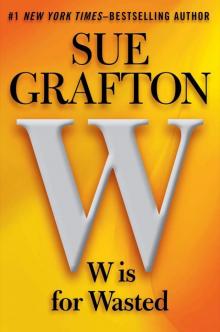 W Is for Wasted
W Is for Wasted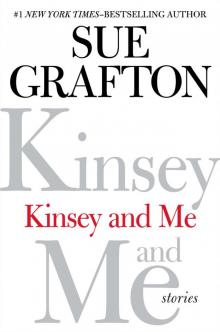 Kinsey and Me: Stories
Kinsey and Me: Stories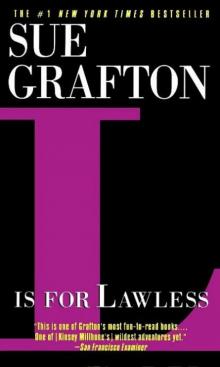 L Is for Lawless
L Is for Lawless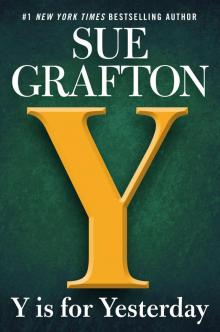 Y Is for Yesterday
Y Is for Yesterday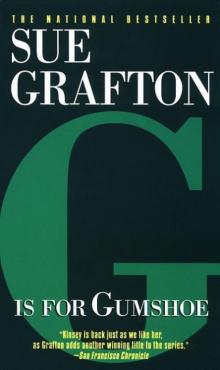 G Is for Gumshoe
G Is for Gumshoe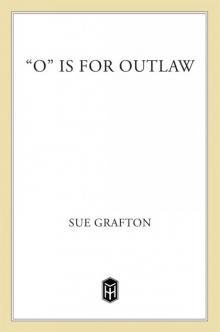 O Is for Outlaw
O Is for Outlaw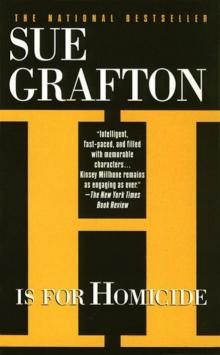 H Is for Homicide
H Is for Homicide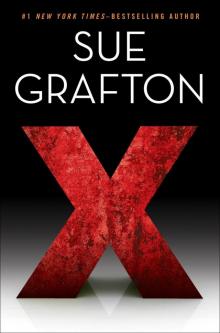 X
X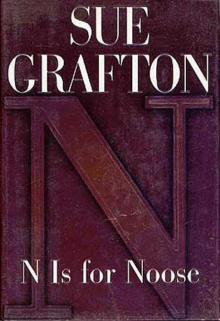 N Is for Noose
N Is for Noose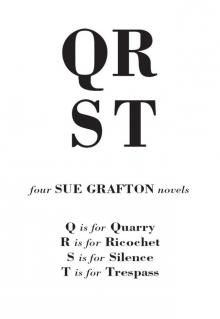 Three Complete Novels: A Is for Alibi / B Is for Burglar / C Is for Corpse
Three Complete Novels: A Is for Alibi / B Is for Burglar / C Is for Corpse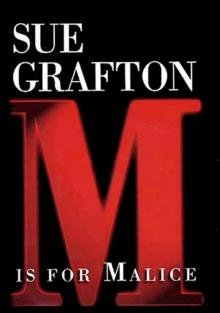 M Is for Malice
M Is for Malice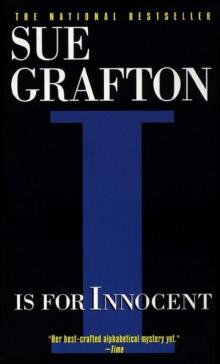 I is for INNOCENT
I is for INNOCENT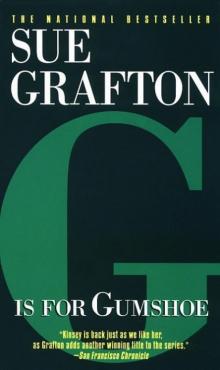 G is for GUMSHOE
G is for GUMSHOE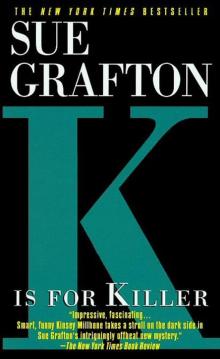 K is for KILLER
K is for KILLER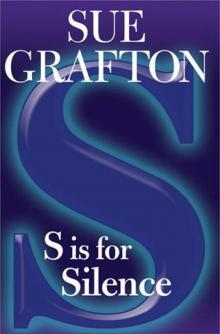 S is for SILENCE
S is for SILENCE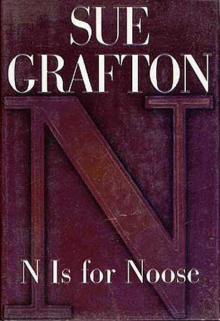 N is for NOOSE
N is for NOOSE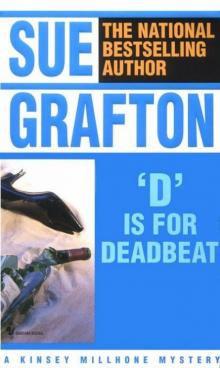 D is for DEADBEAT
D is for DEADBEAT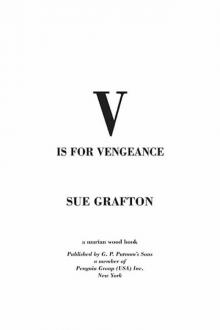 V is for Vengeance
V is for Vengeance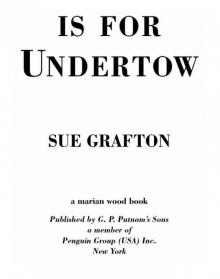 U is for Undertow
U is for Undertow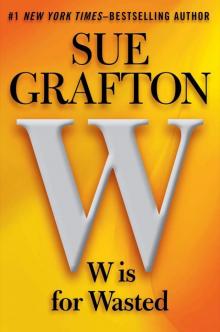 W Is for Wasted km-23
W Is for Wasted km-23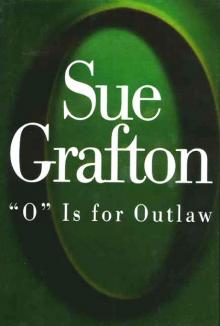 O is for OUTLAW
O is for OUTLAW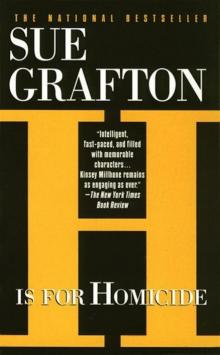 H is for HOMICIDE
H is for HOMICIDE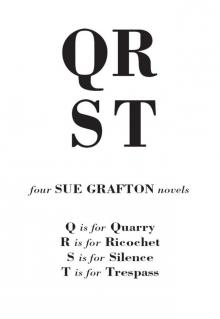 Sue Grafton Novel Collection
Sue Grafton Novel Collection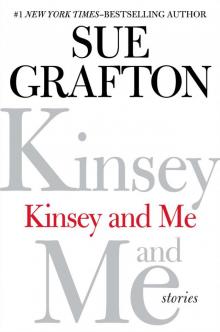 Kinsey and Me
Kinsey and Me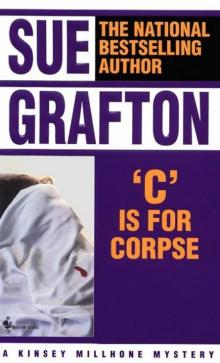 C is for CORPSE
C is for CORPSE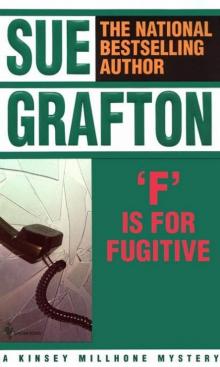 F is for FUGITIVE
F is for FUGITIVE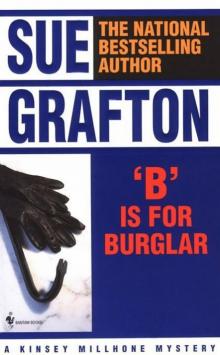 B is for BURGLAR
B is for BURGLAR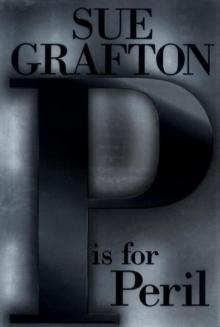 P is for PERIL
P is for PERIL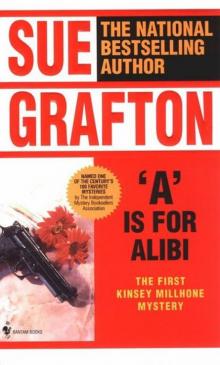 A is for ALIBI
A is for ALIBI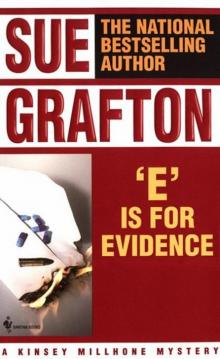 E is for EVIDENCE
E is for EVIDENCE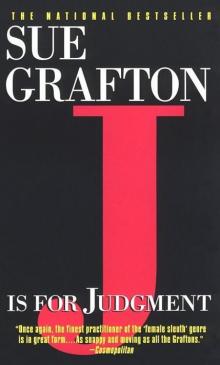 J is for JUDGMENT
J is for JUDGMENT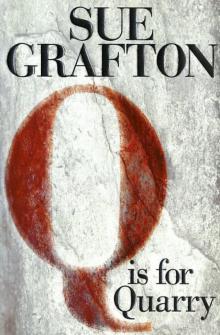 Q is for QUARRY
Q is for QUARRY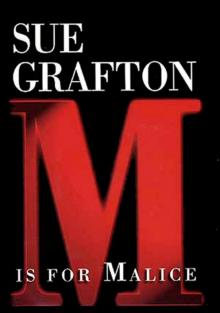 M is for MALICE
M is for MALICE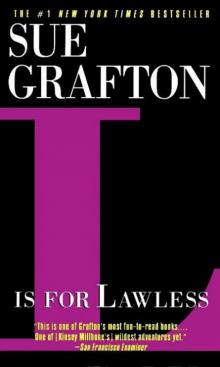 L is for LAWLESS
L is for LAWLESS